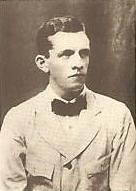R. H. Bruce Lockhart
ex Wiki
QUOTE

Sir Robert Hamilton Bruce Lockhart KCMG (2 September 1887 – 27 February 1970), was a journalist, author, secret agent, British diplomat in Moscow and Prague, and footballer. His 1932 book Memoirs of a British Agent became an international bestseller, and brought him to the world’s attention.
Background
Bruce Lockhart was born in
Anstruther,
Fife,
Scotland,
the son of Robert Bruce Lockhart, the first headmaster of
Spier’s School, Beith, Ayrshire, Scotland. His mother was a Macgregor, while
his other ancestors include Bruces, Hamiltons, Cummings, Wallaces and Douglases.
He also claimed he could trace a connection back to
Boswell of Auchinleck. In his book,
Memoirs of a British Agent, he wrote, "There is no drop of English blood in
my veins."
His family were mostly schoolmasters. His brother John Harold Bruce Lockhart was the headmaster of Sedbergh School, while his nephews Rab Bruce Lockhart and Logie Bruce Lockhart went on to become headmasters of Loretto and Gresham’s. His great-nephew, Simon Bruce-Lockhart, is currently the headmaster of Glenlyon Norfolk School.[1]
Bruce Lockhart went to school himself at Fettes College in Edinburgh.[2]
Career
At the age of twenty-one, Bruce Lockhart went out to
Malaya to join two uncles who were rubber
planters there. According to his own account, he was sent to open up a new
rubber estate near
Pantai in
Negeri Sembilan, in a district where "there were no other white men". He
then "caused a minor sensation by carrying off Amai, the beautiful ward of the
Dato’ Klana, the local Malay prince… my first romance". However, three years in
Malaya, and one with Amai, came to an end when "…doctors pronounced Malaria, but
there were many people who said that I had been poisoned". One of his uncles and
one of his cousins "bundled my emaciated body into a motor car and… packed me
off home via Japan and America". The Dato’ Klana in question was the
chief of
Sungei Ujong, the most important of the Nine States of Negeri Sembilan,
whose palace was at
Ampangan.[3]
Moscow posting
Bruce Lockhart next joined the British
Foreign Service and was posted to
Moscow as
Vice-Consul
At the time of his arrival in Russia, people had heard that a great footballer named Lockhart from Cambridge was arriving, and he was invited to turn out for Morozov a textile factory team that played their games 30 miles east of Moscow – the manager of the cotton mill was from Lancashire, England. Bruce Lockhart played for most of the 1912 season and his team won the Moscow league championship that year. The great player however was Robert’s brother, John, who had played rugby union for Scotland, and by his own admission Robert barely deserved his place in the team and played simply for the love of the sport.
Bruce Lockhart was Acting British Consul-General in Moscow when the first Russian Revolution broke out in early 1917, but left shortly before the Bolshevik Revolution of October that year.
He soon returned to Russia at the behest of Prime Minister Lloyd George and Lord Milner as the United Kingdom’s first envoy to the Bolsheviks (Russia) in January 1918 in an attempt to counteract German influence.
Lockhart, on his return, was also working for the Secret Intelligence Service and had been given Ł648 worth of diamonds to fund the creation of an agent network in Russia.
Moura Budberg, the widow of a high-ranking Czarist diplomat Count Johann von Benckendorff, became his mistress.[4]
Later, Bruce Lockhart spoke out for Arthur Ransome, saying he had been a valuable intelligence asset amid the worst chaos of the revolution.[5] As the chaos worsened in Russia and purges took hold among the Bolshevik leaders, Lockhart recommended official assistance to bring Trotsky's secretary, Evgenia Petrovna Shelepina, to England.
Lockhart from then on was involved in numerous espionage plots against the Bolshevik government, including a plan to snatch Tsar Nicholas II from their custody.
Siberian Intervention
Bruce Lockhart was asked in March 1918 to persuade the new Soviet government
to allow a
Japanese army onto Soviet territory to fight
Germany on
the Eastern Front.
He was unsuccessful in this endeavour.
Arrest and
imprisonment
In 1918, Bruce Lockhart and fellow British agent,
Sidney Reilly, were dramatically implicated in a plot to
assassinate
Bolshevik
leader
Vladimir Lenin.[6]
He was accused of plotting against the Bolshevik regime and, for a time during
1918, was confined in the
Kremlin as a
prisoner and feared being condemned to death. However, he escaped trial in an
exchange of "secret
agents" for the
Russian
diplomat
Maksim Maksimovich Litvinov.
He later wrote about his experiences in his 1932 autobiographical book, Memoirs of a British Agent which became an instant worldwide hit, and was made into the 1934 film British Agent by Warner Brothers.
Second World War and afterDuring the Second World War, Lockhart became director-general of the Political Warfare Executive,, co-ordinating all British propaganda against the Axis powers. He was also for a time the British liaison officer to the Czechoslovak government-in-exile under President Edvard Beneš.
After the war, he resumed his writing career, as well as lecturing and broadcasting, and made a weekly BBC Radio broadcast to Czechoslovakia for over ten years.
Personal life
Lockhart was the father of author
Robin Bruce Lockhart, who wrote the 1967 book
Ace of Spies — about
his father’s friend and fellow agent
Sidney Reilly — from which the 1983 miniseries
Reilly, Ace of Spies was produced.
Lockhart died in 1970 at the age of 82, but tales of his adventures in Moscow
have recently returned to the public eye when
Scottish
professional
footballer
Garry O’Connor, made the move to
Russian
football club
Lokomotiv Moscow in March 2006.[7]
UNQUOTE
Did rather well in Moscow when things got exciting in 1917. He was in the middle
of the
Russian
Revolution, knowing all of the big players.